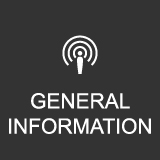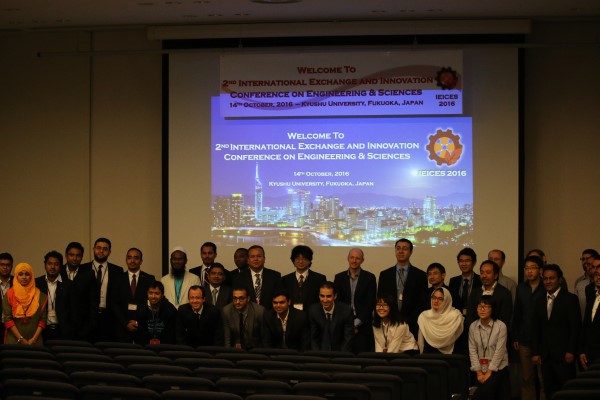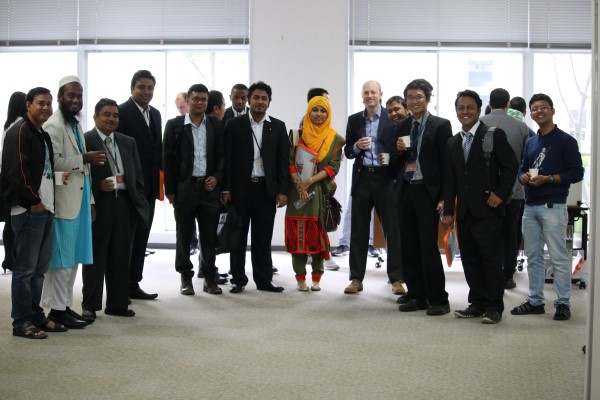Publication Ethics and Publication Malpractice Statement
Complaints and Appeals
At IEICES, we strive to ensure a seamless and inclusive experience for all our participants. We continuously recognize the importance of addressing any comments, concerns or appeals that may emerge during the conference. In handling such matters, our team is committed to upholding the highest standards of integrity, transparency, and fairness.
Over the past several years of conducting this conference, we have developed and implemented a mechanism to address complaints and appeals which are inspired by other esteemed international conferences. We understand that fostering an environment of open dialogue and constructive feedback is crucial to maintain the credibility and quality of our conference. In order to accomplish this, we have established the following procedures:
- Complaint Submission Process
We have a dedicated team that will respond to participant complaints while ensuring a confidentially. Complaints can be sent via the following email: ieicesjapan@gmail.com .
- Prompt Response and Acknowledgment
Upon receiving a complaint, our dedicated committee promptly acknowledges the submission. We understand the importance of addressing concerns in a timely manner and strive to provide an initial response within a specified timeframe, usually within 5 business days.
- Fair and Impartial Investigation
Each complaint is thoroughly investigated by our expert committee, which comprises experienced professionals from the relevant field. We ensure a fair and impartial evaluation of the complaint, considering all relevant information and perspectives involved.
- Open Dialogue and Mediation
In certain cases where resolution requires clarification or mediation, we facilitate open dialogue between the parties involved. This helps foster understanding, resolve conflicts, and seek mutually agreeable solutions.
- Appeals Process
If a participant disagrees with the outcome of their complaint, we provide an appeals process. Participants can submit an appeal, stating the reasons for their disagreement, and providing any additional supporting evidence. The appeal is reviewed by an independent committee of experts not involved in the initial investigation.
- Transparent Communication
Throughout the entire process, we prioritize transparent communication with the complainant and all relevant parties. Regular updates on the progress of the investigation and any subsequent actions taken are provided to ensure transparency and keep everyone involved informed.
- Continuous Improvement
We believe in learning from each experience and continually improving our conference processes. Feedback received through complaints and appeals is carefully considered to identify areas of improvement and implement necessary changes for future conferences.
By implementing these measures, we aim to ensure that all participants of IEICES feel heard, respected, and valued. We at IEICES are committed in preserving the highest standards of professionalism, ethics, and academic integrity in every aspect of our conference.
Ethical Conduct and Oversight at IEICES
IEICES upholds high guidelines for ethical conduct and oversight throughout its gathering. We understand the significance of ethical considerations in the field of science and engineering and strive to ensure the standing, credibility, and trustworthiness of our event. Our commitment to upholding ethical principles is reflected in the following key aspects of our gathering:
- Ethical policies
We have developed a set of comprehensive policies that outline the expected standards of conduct for all participants, including authors, reviewers, and conference organizers. These policies cover various aspects such as plagiarism, data integrity, authorship, conflicts of interest, and adherence to research ethics.
- Review Process
We employ a double-blind review process for all submitted research papers. Our review committee comprises experts in the given field who evaluate the quality, originality, and ethical considerations of each submission. They ensure that the research adheres to our guidelines, respects IP rights, and avoids any form of academic misconduct.
- Plagiarism Detection
To maintain high standards of originality and prevent plagiarism, we utilize advanced plagiarism detection tools. All submitted papers undergo thorough plagiarism checks to ensure that the research is novel and properly references the work of others. Instances of plagiarism or academic misconduct are dealt with promptly and in accordance with our established policies.
- Conflict of Interest Management
We have strict conflict of interest policies in place to ensure impartiality and objectivity in the review process. Reviewers and organizers are required to disclose any potential conflicts of interest that may compromise the integrity of the evaluation. Appropriate actions are taken to address and manage conflicts of interest to maintain fairness and transparency.
- Confidentiality and Data Privacy
We uphold strict confidentiality and data privacy policies to safeguard the information shared by participants. Any personal data collected during the submission or review process is handled in accordance with applicable data protection regulations. We ensure that data is used solely for gathering-related purposes and is securely stored and processed
- Reporting and Accountability
We maintain a culture of accountability and encourage the reporting of any ethical concerns or violations. Participants are provided with clear channels to raise concerns, report misconduct, or seek clarification on ethical matters. All reports are treated with confidentiality and investigated thoroughly, with appropriate actions taken based on the findings
By implementing these ethical oversight policies, we aim to create a trusted platform for researchers, scholars, and professionals to exchange knowledge and ideas. Our commitment to ethical conduct ensures the quality and reliability of the research presented at IEICES thereby contributing to the advancement of science and engineering.
Intellectual property
At IEICES, we place great importance on respecting intellectual property (IP) rights. We are committed to upholding the highest standards in handling IP throughout our conference proceedings by drawing other reputable international conferences in the field of science and engineering. Through our observations, we have developed and implemented a comprehensive approach to safeguarding IP. Our strategies encompass the following key principles:
- Awareness
We believe that prevention is better than cure. Therefore, we prioritize raising awareness among conference participants about their IP rights, including but not limited to copyright, patent, and trademark laws. We constantly emphasize the importance of respecting and protecting the IP of others.
- Authorship
We encourage proper authorship and attribution practices, ensuring that all contributions are appropriately acknowledged. Authors are required to accurately cite prior work and give due credit to existing IP in their submissions.
- Plagiarism Prevention
We employ stringent measures to detect and prevent plagiarism. All submitted papers undergo a rigorous plagiarism check using advanced tools to ensure the originality of the research. Instances of plagiarism or academic misconduct are treated seriously and addressed in accordance with our established policies.
- Intellectual Property Disclosure
We encourage authors to disclose any potential IP disclosures relevant to their research during the submission process. This ensures transparency and helps avoid conflicts of interest.
- Confidentiality
We prioritize maintaining confidentiality in handling IP-related matters. We ensure that sensitive information shared during the conference, such as unpublished research findings, is protected and used solely for conference-related purposes.
- Copyright Compliance
We respect copyright laws and encourage authors to comply with relevant copyright regulations. Permission and acknowledgments from an authorized source are required for the use of copyrighted materials, including images, figures, and other content.
- Intellectual Property Disputes
In the event of IP issues or matters raised during the conference, we provide a mechanism for reporting and addressing such issues. We treat these matters with utmost seriousness and handle them privately and fairly. Expert panels may be formed to investigate and resolve disputes, ensuring a balanced approach.
By implementing these measures, we aim to create a conference environment that promotes the protection and handling of IP and ultimately contribute to the advancement of science and engineering while maintaining the trust and confidence of our participants.
Post-publication Discussion and Corrections
At IEICES, we highly value the principles of open scientific discourse and continuous improvement. We understand that the dissemination of research does not end with publication and that ongoing discussions and corrections are vital for advancing knowledge in the field of science and engineering.
We are committed to providing open access to conference publications, ensuring that the latest research findings are widely accessible. This accessibility encourages engagement and enables scholars and researchers from around the world to participate in post-publication discussions. All our publications can be found on this website.
We recognize that errors or oversights may occur in published materials. To address this, we have established a robust correction mechanism. Authors and readers are encouraged to report any identified inaccuracies or mistakes. Our editorial team carefully reviews each report and takes the necessary action to rectify and update the published content thus upholding the integrity and accuracy of our publications.
In certain cases where significant errors, ethical concerns, or misconduct are identified in work published by our conference, we aim to adhere to the internationally accepted guidelines for retractions. We have a well-defined retraction policy in place to ensure the timely and appropriate retraction of problematic publications. We take such matters seriously and prioritize the credibility and reliability of the research presented at our conference.
Our editorial team plays a vital role in overseeing post-publication discussions and corrections. They actively engage with participants, respond to queries, and provide guidance as needed. Their dedication ensures the integrity and accuracy of the conference publications.
We view post-publication discussions and corrections as valuable opportunities for learning and improvement. Feedback and insights shared during these processes contribute to enhancing the quality and impact of future publications. We are committed to continuously improving our practices based on these valuable contributions.
By fostering an environment that encourages post-publication discussion and correction, we aim to promote collaboration, transparency, and continuous learning within the scientific community. These efforts strengthen the credibility of the research presented at IEICES and reflect our commitment to excellence in pursuit of Scopus approval.
Duties of Editors
- Publication Decisions
The editor of the journal is responsible for deciding which of the articles submitted to the journal should be published. The editor may be guided by the policies of the journal's editorial board and constrained by such legal requirements as shall then be in force regarding libel, copyright infringement and plagiarism. The editor may confer with other editors or reviewers in making this decision.
- Fair Play
An editor will at any time evaluate manuscripts for their intellectual content without regard to race, gender, sexual orientation, religious belief, ethnic origin, citizenship, or political philosophy of the authors.
- Confidentiality
The editor and any editorial staff must not disclose any information about a submitted manuscript to anyone other than the corresponding author, reviewers, potential reviewers, other editorial advisers, and the publisher, as appropriate.
- Disclosure and Conflicts of Interest
Unpublished materials disclosed in a submitted manuscript must not be used in an editor's own research without the express written consent of the author(s).
Duties of Authors
- Reporting Standards
Authors of reports of original research should present an accurate account of the work performed as well as an objective discussion of its significance. Underlying data should be represented accurately in the paper. A paper should contain sufficient detail and references to permit others to replicate the work. Fraudulent or knowingly inaccurate statements constitute unethical behavior and are unacceptable.
- Data Access and Retention
Authors are asked to provide the raw data in connection with a paper for editorial review, and should be prepared to provide public access to such data, if practicable, and should in any event be prepared to retain such data for a reasonable time after publication.
- Originality and Plagiarism
The authors should ensure that they have written entirely original works, and if the authors have used the work and/or words of others that this has been appropriately cited or quoted.
- Multiple, Redundant or Concurrent Publication
An author should not in general publish manuscripts describing essentially the same research in more than one journal or primary publication. Submitting the same manuscript to more than one journal concurrently constitutes unethical publishing behavior and is unacceptable.
- Acknowledgement of Sources
Proper acknowledgment of the work of others must always be given. Authors should cite publications that have been influential in determining the nature of the reported work.
- Authorship of the Paper
Authorship should be limited to those who have made a significant contribution to the conception, design, execution, or interpretation of the reported study. All those who have made significant contributions should be listed as co-authors. Where there are others who have participated in certain substantive aspects of the research project, they should be acknowledged or listed as contributors. The corresponding author should ensure that all appropriate co-authors and no inappropriate co-authors are included on the paper, and that all co-authors have seen and approved the final version of the paper and have agreed to its submission for publication.
- Disclosure and Conflicts of Interest
All authors should disclose in their manuscript any financial or other substantive conflict of interest that might be construed to influence the results or interpretation of their manuscript. All sources of financial support for the project should be disclosed.
- Fundamental Errors in Published Work
When an author discovers a significant error or inaccuracy in his/her own published work, it is the author's obligation to promptly notify the journal editor or publisher and cooperate with the editor to retract or correct the paper.
Duties of Reviewers
- Contribution to Editorial Decisions
Peer review assists the editor in making editorial decisions and through the editorial communications with the author may also assist the author in improving the paper.
- Promptness
Any selected referee who feels unqualified to review the research reported in a manuscript or knows that its prompt review will be impossible should notify the editor and excuse herself/himself from the review process.
- Confidentiality
Any manuscripts received for review must be treated as confidential documents. They must not be shown to or discussed with others except as authorized by the editor.
- Standards of Objectivity
Reviews should be conducted objectively. Personal criticism of the author is inappropriate. Referees should express their views clearly with supporting arguments.
- Acknowledgement of Sources
Reviewers should identify relevant published work that has not been cited by the authors. Any statement that an observation, derivation, or argument had been previously reported should be accompanied by the relevant citation. A reviewer should also call to the editor's attention any substantial similarity or overlap between the manuscript under consideration and any other published paper of which they have personal knowledge.
- Disclosure and Conflict of Interest
Privileged information or ideas obtained through peer review must be kept confidential and not used for personal advantage. Reviewers should not consider manuscripts in which they have conflicts of interest resulting from competitive, collaborative, or other relationships or connections with any of the authors, companies, or institutions connected to the papers.
Copyright Statement
In submitting a manuscript to International Exchange and Innovation Conference on Engineering & Sciences (IEICES), authors are assumed to declare that the work is original, has not been made publicly available elsewhere, and will not be offered for publication elsewhere whilst it is under consideration by IEICES. The sources of any parts of the manuscript that are reproduced from other sources must be appropriately acknowledged, with permission from copyright owners if necessary. Copyright is automatically assigned to IGSES, Kyushu University.
International Exchange and Innovation Conference on Engineering & Sciences Proceedings follow the open access journal format, which means that all content is freely available without any charge to the user or his/her institution.
The authors of articles published in IEICES Proceedings may place copies in their own Institutional Repositories immediately after publication on the Conference’s website, without any embargo period.
The open access format used in the context of IEICES Proceedings follows the Creative Common Attribution (CC BY-NC-ND) version 4.0 licensing, which means that the reproduction of the articles, online (e.g. posting on authors' website) and offline (e.g. printing), can be done under the assumption that a proper and full credit is given to the authors, the articles are reproduced in its original and unaltered form, and the reproduction is intended only for non-commercial use.
For more information:
Creative Common License
https://creativecommons.org/licenses/by-nc-nd/4.0/










![C-Cube [IEICES Venue] C-Cube [IEICES 2016 Venue]](data1/images/a3.jpg)


 4
4 5
5 6
6 7
7 8
8 1
1![C-Cube [IEICES 2016 Venue]](data1/tooltips/a3.jpg) 2
2 0
0 3
3


